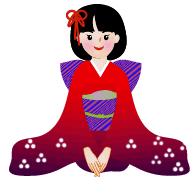Why am I studying Japanese?
🍘 🍙 🍚 🍡 🍢 🍣 🍥
My first exposure to anything Japanese was when I learned about Chiune Sugihara, a Japanese diplomat in Lithuania who issued thousands of Jews illegal visas to flee Nazi-occupied Europe. Sugihara is credited with saving what is now the largest institute of Jewish Torah learning in the world, the Mir Yeshiva, where members of my family have studied.
Along the way, I've also become interested in Japanese culture of politeness and restraint in day-to-day interactions, behaviors which starkly contrast with how people in American culture tend to express themselves.
Having grown an affinity for manga and anime as well, I've come to really appreciate Japan's people, language and culture and therefore I am really looking forward to studying Japanese.
What am I excited for about Japanese?
Japanese is different from any other language that I've studied thus far, so I'm excited to be able to read hiragana, katakana and (hopefully) kanji and add these syllabaries and their vocabularies to my repertoire. I hope to be able to engage native Japanese speakers in natural conversation, perhaps one day in Japan. 👹
🍘 🍙 🍚 🍡 🍢 🍣 🍥
My first exposure to anything Japanese was when I learned about Chiune Sugihara, a Japanese diplomat in Lithuania who issued thousands of Jews illegal visas to flee Nazi-occupied Europe. Sugihara is credited with saving what is now the largest institute of Jewish Torah learning in the world, the Mir Yeshiva, where members of my family have studied.
Along the way, I've also become interested in Japanese culture of politeness and restraint in day-to-day interactions, behaviors which starkly contrast with how people in American culture tend to express themselves.
Having grown an affinity for manga and anime as well, I've come to really appreciate Japan's people, language and culture and therefore I am really looking forward to studying Japanese.
What am I excited for about Japanese?
Japanese is different from any other language that I've studied thus far, so I'm excited to be able to read hiragana, katakana and (hopefully) kanji and add these syllabaries and their vocabularies to my repertoire. I hope to be able to engage native Japanese speakers in natural conversation, perhaps one day in Japan. 👹



すぎはらさんはヒーローですね。ミラエシバ (Mir Yeshiva) へいきましたか。
ReplyDeleteはい、すぎはらさんはヒーローですよ!ミルヤシヴァへ行きませんでした。でもイスライルへ行きましたそしてミルヤシヴァのたてもの(building) みました。おおきいたてものです。
Deleteそうですね。いつかいきたいです。おもしろいところです。
Deleteがんばってください〜
ReplyDeleteどうもありがとうございます
Deleteこんにちは。わたしは松本 紗雪(まつもと さゆき)です。18さいです。10がつ12にちで19さいになります。
ReplyDeleteわたしはくまもとというまちでうまれました。わたしのふるさとであるあまくさは、とても海(うみ)がきれいなところです。一年中(いちねんじゅう)たくさんのイルカに会(あ)うことができます。
わたしはおんがくがすきです。3さいからピアノをえんそうしています。小学生(しょうがくせい)のときから、すいそうがくもしています。あなたはおんがくがすきですか?
たのしいこうりゅうをしましょう!
Hello. My name is Sayuki Matsumoto. I’m 18 years old. I will be 19 years old on October 12.
I’m from Kumamoto. My hometown Amakusa has very beautiful seas. We can meet many dolphins throughout the year.
I like music. I have played the piano since I was three. Also, I have played the brass band since I was elementary school student. Do you like music?
Let’s have happy exchanges!
こんにちは松本さん!どうぞよろしくおねがいします。すみません for the late reply でもたんじょうびおめでとうございます。パーテイーをしましたか?わたしもじゅうきゅうさいです。
Deleteくまもとは sounds very beautiful! 海がだいすきです。
おんがくがだいすきです。すこしギターっをえんそうしています。そしてうたうのがすきです。なんの曲はすきですか?